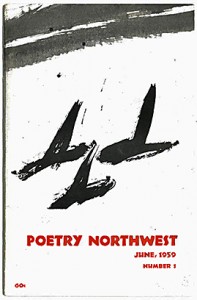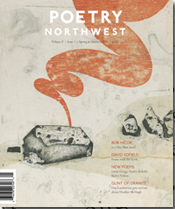About
A Brief History of Poetry Northwest
First Series established 1959

Cover by Mark Tobey
Poetry Northwest was founded as a quarterly, poetry-only journal in 1959 by Errol Pritchard, with Carolyn Kizer, Richard Hugo, Nelson Bentley, and Edith Shiffert (“Far Eastern”) as co-editors. The first issue was 32 pages and included the work of Philip Larkin, James Wright, and William Stafford, with a cover designed by Mark Tobey.
Poetry Northwest soon gained an international reputation for publishing some of the best established and emerging poets in the U.S., Canada, Great Britain, and beyond, including such notables and award winners as Stanley Kunitz, Mona Van Duyn, Maxine Kumin, Thom Gunn, Phillip Larkin, May Swenson, Theodore Roethke, Hayden Carruth, W.S. Merwin, John Berryman, Czeslaw Milosz, Philip Levine, and Anne Sexton.
In 1963, Poetry Northwest became a publication of the University of Washington. In 1964, Carolyn Kizer became the sole editor of the magazine, and held that post until 1966, when she resigned to become the first Literature Director at the National Endowment for the Arts. David Wagoner was appointed the new editor, a position he held for 36 years.
During Wagoner’s tenure, the magazine continued to publish established poets alongside new and emerging writers. Writers such as Harold Pinter, Joyce Carol Oates, Annie Dillard, Raymond Carver, James Welch, Ted Kooser, James Dickey, Robert Pinsky, Richard Wilbur, Wendell Berry, Charles Baxter, Mary Oliver, Edward Hirsch, Stanley Plumly, Linda Pastan, Stephen Dobyns, Stephen Dunn, Jorie Graham, Michael Harper, Mark Strand, Dean Young, and Robert Wrigley were among the major contributors to its pages, which continued to feature poetry only until 2002.
In 2002, after several years of difficult financial circumstances, Poetry Northwest — at the time one of the longest-running poetry-only publications in the country — temporarily ceased publication.
New Series established 2005
In August 2005, the University of Washington appointed David Biespiel the new editor of Poetry Northwest, with an agreement that the editorial offices of the magazine would relocate to the Attic Writers’ Workshop (now the Attic Institute) in Portland, Oregon. The new series resumed publication in March 2006, in a larger, trade magazine format, appearing biannually as a print edition, with new monthly features published online. The magazine was incorporated as a 501(c)3 nonprofit in March 2007. Circulation quickly rebounded, surpassing pre-2000 levels as devoted readers rediscovered an old favorite, and new readers embraced the innovative format and the magazine’s entrance into the digital arena.
In January 2010, the Board of Directors appointed Kevin Craft the fifth editor of Poetry Northwest. Craft returned the editorial offices to the greater Seattle area, reaching an agreement with Everett Community College to house and publish the magazine at Everett, where it plays an integral role in EvCC’s Written Arts AFA Program. Even so, Poetry Northwest remains an independent, autonomous nonprofit organization wholly dependent on subscriber and community support.
In 2016, the Board of Directors appointed Aaron Barrell and Erin Malone as co-editors of the magazine. Kevin Craft was appointed executive editor and then, in 2020, Publisher.
In 2020, Keetje Kuipers was appointed editor, with Malone resigning and Barrell continuing as Managing Editor.
The Poetry Northwest Mission

Cover by Claire Cowie
As editor, Keetje Kuipers continues the work of previous editors: to maintain the magazine’s connection to its founding principles — as a publication that honors the printed poem, as an arena for both established and emerging writers, and as a platform for regional, national, and international writers to intersect with an audience of rough, ready, and discerning readers — while at the same time adapting to the changing circumstances of publishing and the demands of growing and maintaining an audience in the digital age.
In one sense, the mission of Poetry Northwest remains what it has been for more than five decades — to give place and attention to each poem we publish, to serve as a gateway for emerging writers, to represent our vital corner of the continent to a broader audience, and to attract and sustain readers with the promise of discovery. To do this effectively in the digital age, we have expanded the kind of material we publish, and now include book reviews, essays on poetics and other cultural explorations, and visual arts features, both in print and online.
With support from The Kinsman Foundation, The Greater Everett Community Foundation’s Robyn Johnson Poetry Fund, and the NEA, among others, we are continuing to build out the website, including plans to make the full archive of the magazine’s first series available. We are interested in the ways that poetry intersects with and informs (or is informed by) the other arts and sciences, the way that poetry has adapted to new technologies and modes of composition and distribution, the role that poetry can play in restoring sanity, nuance, and balance to civic discourse. At the root of our vision, though, is the poem itself — its unique and special propensity for binding together the varieties of experience in words, form and feeling.
As Carolyn Kizer once noted, “We shall continue to encourage the young and the inexperienced, the neglected mature, and the rough major talents and the fragile minor ones.” Indeed, we remain as committed as we were in 1959 to publishing the best poetry we can find, to expanding the public role and private scope of poetry in ways both innovative and traditional, as a practical art, as well as a clear and necessary dialogue in a world overrun with noise. “Above all,” Craft wrote in his inaugural issue (Spring 2010), “we’re on the lookout for poems that offer an experience, palpable or possible, of being in the world, poems that articulate a biography of imagination, that revel in slow time, deep time, upend-able sense.” For writers and readers everywhere, Poetry Northwest remains a dependable source of illumination.
Read an interview with Editor Keetje Kuipers in Poets & Writers, here.
